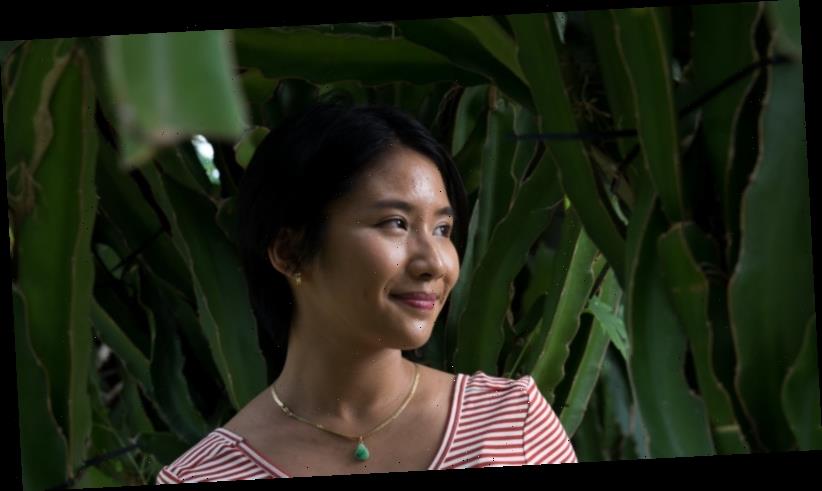Fiction
The Coconut Children
Vivian Pham
Vintage, $32.99
The odd title of Vivian Pham’s debut novel comes from the father of one of the characters. He has a theory as to why coconut trees often lean over bodies of water. It’s because the coconut children on the trees need to drop there: ‘‘that way the ocean can carry them to another island, where they can grow.’’ It’s a neat metaphorical allusion for a book about diaspora and dislocation by a 19-year-old writer whose confidence and skill set belie her youth.
Vivian Pham’s The Coconut Children is blessed with humour and vivid characterisation.Credit:Janie Barrett
From the very first line in the prologue, there’s poetry in the mouth, when Pham waxes lyrical about how the ‘‘full moon floats in the night sky like a cataract. Heaven had turned a blind eye to the boat people". The Coconut Children is about the Vietnamese descendants of those who came to Australia in a fishing vessel with 200 too many onboard, who’d witnessed deaths and survived pirates and who had wrists bound to the handrail above deck to ward against being washed overboard.
Fast forward to western Sydney, in and around Cabramatta in 1998, and 16-year-old Vincent Tran is back in the ’hood after two years in juvenile detention, with the same indecent swagger he had before he’d left: restless, forever pulsating, and ‘‘always looking as though he was about to break out of his own body’’. With his muscles, cheekbones and hair gel he’s the kind of bad boy beloved by good girls the world over.
The teenage felon’s return has not gone unnoticed, particularly by Sonny Vuong, his childhood friend (their mothers had once worked in the same nail salon). Sonny’s naive romantic-sexual stirrings meant that she was constantly falling in love with random males and reading illicit racy fiction. But now that Vincent has reclaimed his patch, ‘‘she wanted any excuse to talk to him, to go up to him and ask for a spare coin, for a spare heart, for the directions to his eyes’’.
Credit:
The narrative moves between the two protagonists, following their respective lives in and out of school and home. Given that the western Sydney-based author is so close in age to her characters, their experiences wear the colour of authenticity. Pham foregrounds their gentle coming together against the grim detritus of a neighbourhood in thrall to drugs and sunken in poverty.
She doesn’t shield our eyes to the junkies prone on park benches; the badly ventilated, mouldy-carpeted classrooms, the mischief and law-breaking of Vincent and his gang of toughs, and most of all the punishing effects of gambling and alcoholism across this low-rent postcode as its citizens (most of whom are immigrants trying to eke out a hardscrabble existence and to sink the memory of past horrors) try to sweeten a sour life.
Family life, in all its shades of love and suffering, are on unglamorous display. Pham is particularly good at teasing out the strained and contentious relationships Sonny and Vincent have with their respective parents; unresolved sexual and domestic abuse make up the shared stories, both spoken and hidden. Their younger siblings, too, are what brings out the teenagers’ innate protectiveness: a desire to shield the innocent from the ills of the world.
For all its darkness and violence, the novel is graced with humour, vivid characterisation and an unerring sense of place and time. Pham juxtaposes surprisingly delicate moments amid the grit: bright respite, like the straggling flowers on the rail embankments that catch Sonny’s eye, or the tender Vietnamese ballads of loss sung at karaoke by Vincent’s rag-tag posse.
Despite his reputation as the boy who wanted ‘‘to grow up quick, to grow up dangerous’’, there is also a softness to Vincent that Sonny slowly draws out, and the nostalgia of their childhood friendship is beautifully remembered: he ‘‘bit into the fruit of his memory, skin and all, and let the light explode on his tongue’’.
The Coconut Children is about having second and third chances, about a defiance of hereditary malaise and a reminder, too, that ‘‘sometimes, having hope is as simple as letting yourself forget who you’ve been before’’.
Vivian Pham is a guest at Sydney Writers’ Festival, April 27-May (swf.org.au). Thuy On's poetry collection, Turbulence, is published by UWA Publishing.
Source: Read Full Article


